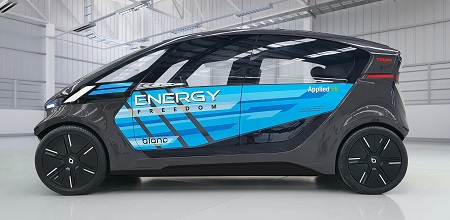Teijin Limited and Applied Electric Vehicles (Applied EV) have developed a highly energy-efficient low-speed electric vehicle (LS-EV) prototype for autonomous driving systems and other mobility applications that are expected to help realise zero-emission mobility.
The four-seat LS-EV embodies a Well-to-Wheel Zero-Emission approach that combines Teijin’s proprietary technologies and expertise in strong, lightweight materials, processing and moulding technologies and Applied EV’s technologies including an entirely new Mobility vehicle platform called Blanc Robot, built entirely from first principles, integrating a new, high efficiency driveline and full “drive-by-wire” technologies.
The vehicle, which is built on the Blanc Robot zero-emission robotic vehicle platform developed by Applied EV, incorporates Teijin materials and technical know-how. It runs on remarkably little energy, achieving unprecedented energy efficiency for an autonomous vehicle, consuming roughly the same amount of energy as a human pedestrian. It can also be used for autonomous driving systems.

Teijin’s lightweight and highly impact resistant Panlite® polycarbonate resin glazing is the material used for the windows and doors, the vehicle’s main components, enabling the stylish body. Panlite® used for the prototype also provides excellent infrared blocking and help to moderate temperatures in the cabin interior. The curved roof, which has been integrally molded with a Panlite® glazing, is fitted with a solar panel and lightweight power supply module. The system achieves output of about 330W, which is equivalent to that of a conventional solar panel housed under glass. Moreover, Teijin Frontier’s vertically oriented polyester non-woven fabric provides insulation from ambient temperatures and road noise outside of the vehicle.
The field of mobility is undergoing a significant transformation propelled by new concepts such as connected, autonomous, shared and electric (CASE) vehicles and Mobility as a Service (MaaS). Electrification and autonomous technologies are rapidly being developed for next-generation mobility applications that will help to reduce environmental impact and address new needs in society, such as transportation for aging societies.
The shift to electric mobility is focusing attention on the benefit of the Well-to-Wheel Zero-Emission approach, which takes into account the total energy efficiency of vehicles, including how their electricity is sourced and how efficiently it is used during driving. Teijin and Applied EV, which commenced their joint-development collaboration in 2019, are committed to establishing a technological foundation for supporting practical multipurpose zero-emission vehicles in future society.

 iConnectHub
iConnectHub
 Login/Register
Login/Register Supplier Login
Supplier Login


























